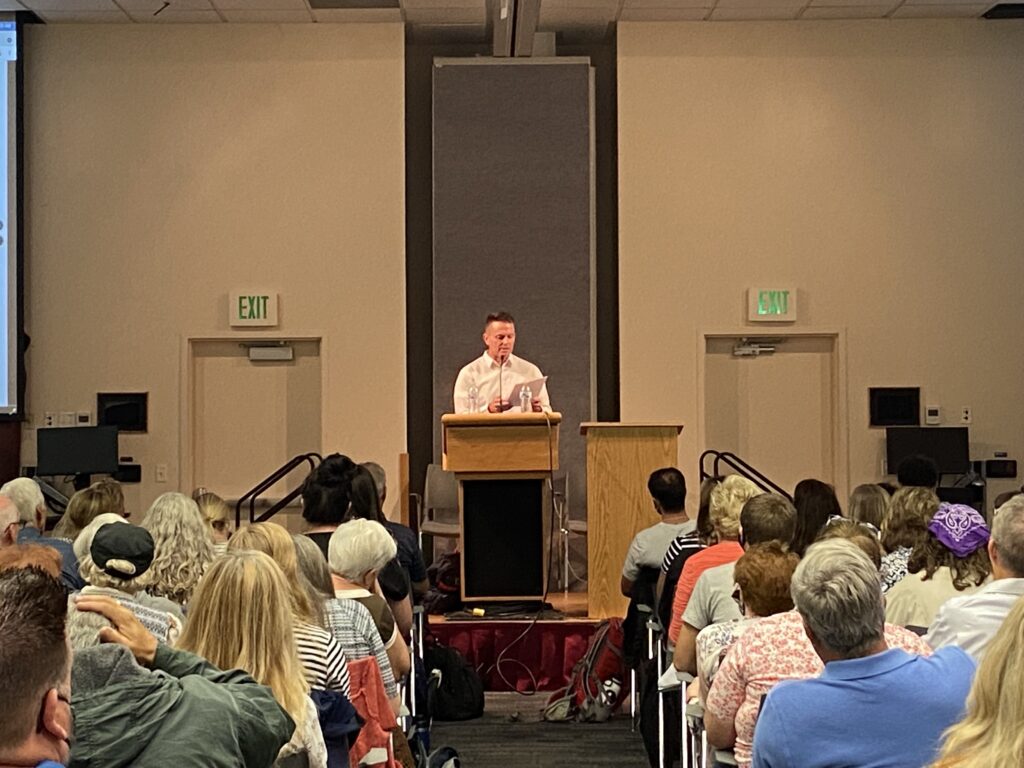
BYU associate professor and psychologist Scott Braithwaite discussed the ways people can build their best selves on Thursday morning during Education Week.
Braithwaite shared the steps people can take, connecting them with inspirational stories from his own personal experience.
Pushing the upper limits with “deliberate practice“
Braithwaite said most people have over 10,000 hours in certain skills. An example he used to portray this was with typing. There are many who have practiced typing for a long time — over a span of many years whether through work or school. However, he said a very small amount of people could actually type around 500 words per minute. This, he said would require deliberate practice.
“Deliberate practice requires a focus on doing things you cannot yet do — pushing the upper limits of your abilities,” he said.
Braithwaite said many times people will spend their time doing things they are already good at. However, this exacerbates plateaus. Deliberate practice occurs at the “sweet spot” that is just beyond the current level of ability everyone has.
He listed three steps deliberate practice involves:
The first is that deliberate practice will be uncomfortable as it requires a focus on doing something that one cannot yet do. Deliberate practice is when one is gritting their teeth and barely able to keep on doing that one thing because the upper limits of their ability are being pushed, Braithwaite said.
The second step is being willing to receive criticism and critique. “Deliberate practice involves seeking feedback targeted at improvement,” Braithwaite said.
Talking to someone who knows a lot about something and asking them to outline everything that is being done wrong is required. This will help improve one’s ability tremendously, he said.
Finally, deliberate practice is so intense that one should only be able to do it for a few hours per day. “When people start doing this, they typically can do only an hour or maybe 90 minutes.” The intensity, he said, is most important, rather than the duration of the activity.
Braithwaite then shared a story about violinists at prestigious orchestras. They found that elite performers practiced alone for about 3.5 hours a day, while those who weren’t good performers only practiced 1.3 hours a day. Elite performers also incorporated deliberate practice, pushing themselves to the upper limits of their ability.
The Plan of Salvation and deliberate practice
Braithwaite said pushing the limits of one’s abilities by doing something they cannot yet do ties in with the Plan of Salvation. He said the Plan of Salvation corresponds to the scripture D&C 1:31: “For I the Lord cannot look upon sin with the least degree of allowance.” Braithwaite said the Lord knows that those who are pushing the upper limits of their ability are stretching and growing to become more perfect.
Another aspect of deliberate practice that ties in with the Plan of Salvation is “feedback on imperfect performance with an eye toward incremental improvement,” Braithwaite said. Repentance is similar to this — through repentance anyone can get closer to improving and becoming better.
Another similarity between deliberate practice and the Plan of Salvation is “eventually developing into an expert after a long refining process.” He said this is what God asks everyone to do by asking the question found in 3 Nephi 27:27 “What manner of men (and women) ought ye to be? Verily I say unto you, even as I am.”
Braithwaite said life is about taking risks, using agency to make important choices so that one can get closer to becoming like God.
The Atonement, fear and discipleship
Life actually isn’t really like a test, but more like “an apprenticeship,” Braithwaite said. The main goal of anyone who lives on Earth is to become more like their Heavenly Parents, and to do that everyone must go live the kind of life They live. This can be done by following the commandments as they “reflect the character of God.”
“Because of the Atonement we can learn through our discipleship, even if we’re imperfect we can grow grace for grace without being condemned by our imperfections,” Braithwaite said.
People shouldn’t let fear stop them from making important decisions, he said. Using and accessing the Atonement can help anyone who is imperfect become more like God every day.
He encouraged the audience to ponder on the question “What Christlike attributes do you need to develop more fully?” He said there are Christlike attributes that can always be more developed as people seek to become perfected.
He concluded with the idea that many people often don’t engage in things intentionally because of the fear of doing something wrong. However, he said it’s Satan’s plan to stop people from making decisions and achieving what they want.
Braithwaite said it’s important to never let fear stop anyone from doing what they want to achieve. Moving past that fear, he said, is how people can build their best selves and ultimately become the best disciples they can be.




